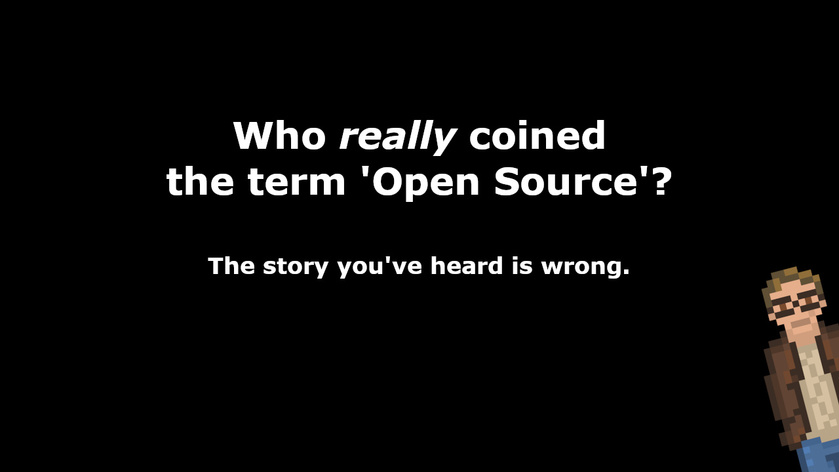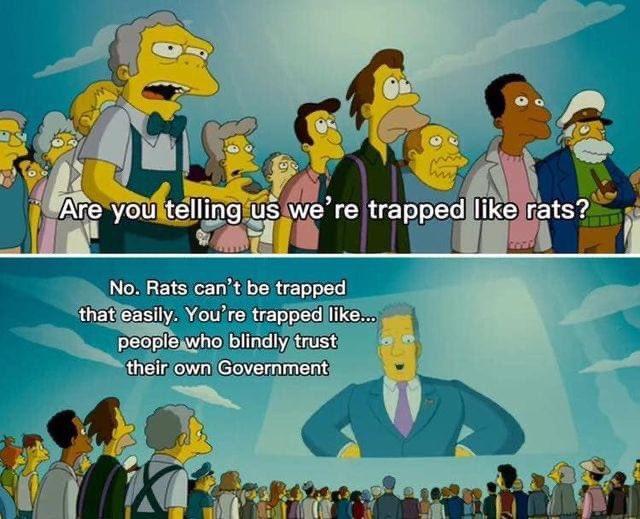Nowadays, “Open Source” is a well understood, widely used concept. Everyone who works within the software development world understands what it means.
But… who coined the term? Who is the first person to actually use the phrase “open source” in reference to software? Let's dive into some of the (sometimes conflicting) statements from multiple people… and what the reality actually looks like.
Was it Eric S Raymond or Bruce Perens? (Who, together, founded the Open Source Initiative in 1998.) Or, perhaps, Richard Stallman? Turns out… not any of those guys. At least not initially.
Let's start with the accepted origin of the term by the Open Source Initiative… and then dig further into the past... and why the Open Source Initiative is very, very wrong.
February 5, 1998 - Christine Peterson
In a recounting of a meeting, held on Feb 5, 1998, Christine Peterson of the Foresight Institute was attending a meeting with the likes of Eric S Raymond and Jon “maddog” Hall.
During that meeting, according to a recounting by Peterson, the topic turned to terminology. What phrase should be used for what we all now understand as “open source”?
A few options were floated – such as “freely distributable”, “cooperatively developed”, and “sourceware”. Christine Peterson recals that she was “the originator of the term ‘open source software’” and “between meetings that week, I was still focused on the need for a better name and came up with the term ‘open source software.’ While not ideal, it struck me as good enough.”
Peterson mentioned the phrase to Todd Anderson, who then mentioned it during the meeting. Peterson allowed the rest of the members of that 1998 meeting to come to their consensus on it.
Eric S Raymond, in response to this, stated the following:
“Chris's account matches my recollections in every respect and reminds me of some details I had forgotten. I fully endorse it.
I can add that it was indeed I who explicitly brought up terminology as an issue. I had a clearer initial sense than others there (though they did catch up with me later) that we were in effect planning a marketing and branding campaign. That sense was driving my thinking, and continued to do so for months afterwards. But it was something I didn't talk about much because I knew “marketing” was a bad word to these died-in-the-wool geeks, something they'd need to get used to thinking about gradually. I'd had to struggle with the concept myself before making peace with it.
The only other important thing this account leaves out is something Chris didn't know because she couldn't read my mind. The truth is that I spotted “open source” as the winner we were looking for almost immediately, the first or maybe second time it came up, well before I started advocating for it later in the discussion.
You see, I too was feeling like it was important not to step on the discussion, better to allow a consensus to develop without me forcing it. But I spotted the useful connection to “open source” as used in intelligence work immediately and was more excited than I let on. It seemed perfect for our propaganda needs - ideologically neutral, easily parsed, just enough connection to a respectable and established term of art. I was very impressed with Chris for inventing it.
I actually felt a considerable sense of relief when the other participants gravitated to the term. I would have fought for it over the alternatives on offer, but didn't have to. Bright crowd at that meeting; I was ahead of the curve only because I had put concentrated thought into the problems before I walked in. We all figured out what needed to be done, and we did it.
Ever since I was first reminded that “open source” was Chris's coinage I've been careful to credit it to her. She deserves her happy twinge. Maybe I would have come up with the same term or something as good myself, maybe not - it's good that we didn't have to roll those dice.”
But.
Was that really the first time the phrase “open source” was used in reference to software?
Turns out… no.
It, absolutely was not.
Let's go back further.
September 10, 1996 - Caldera
Two years earlier, in 1996, Caldera had acquired a number of assets from Novell. This included DR-DOS, CP/M, and many others originally created by Digital Research (helmed by the late, great Gary Kildall).
On Sep 10, 1996, Caldera released the source code for DR-DOS. The headline for the press release reads as follows:
“CALDERA. ANNOUNCES OPEN SOURCE CODE MODEL FOR DOS”
Going on to say:
“Caldera believes an open source code model benefits the industry in many ways.”
Clearly the phrase “open source” was in common usage (at least among some groups or companies) back in 1996.
But what about… earlier than that?
August 19, 1993 - Jerome (Jerry) Schneider
In a 1993 USENET post (to comp.os.ms-windows.programmer.win32), Jerome Schneider made the following statement:
“Anyone else into “Source Code for NT”? The tools and stuff I'm writing for NT will be released with source. If there are “proprietary” tricks that MS wants to hide, the only way to subvert their hoarding is to post source that illuminates (and I don't mean disclosing stuff obtained by a non-disclosure agreement). Open Source is best for everyone in the long run.”
In a posting entirely about the goodness of releasing source code… it is refered to directly as “Open Source” (with capital first letters). Clearly, we're back to at least 1993 as a commonly used term... a term that was felt to be so obvious and common that it didn't need further explanation.
December 4, 1990 - Kent, the man from xanth
In December of 1990 a post was made to two USENET newsgroups (comp.sys.amiga and alt.religion.computers) that contained the following line:
“BSD's open source policy meant that user developed software could be ported among platforms”
The author was… “Kent, the man from xanth”.
Seriously.
But… can we go back… further?
October 10, 1989 - Chris Mc Donald
October. 1989. Another USENET post (this time to comp.virus) contains the following:
“I am struck by the lack of any reference to Virus-L, RISKS Forum and other INTERNET services which have for years provided we users the best available, open source information on the subject of computer viruses.”
That one feels iffy to me. Could have been interpreted a few different ways. So, let's continue digging back through time.
February, 1987 - The NSA
In a 1990 USENET post (to sci.crypt) by Tony Patti (editor of “Cryptosystems Journal”), there is a reference to a February 1987 document, being obtained via the Freedom of Information Act, which contains the following:
“Although software was developed from open source material, the application of that information into the subject software program contains cryptographic capabilities that are controlled under category 13B.”
Tony Patti, who published that snippet, goes on to say:
“My primary concern is that those policies must comply with the U.S. Constitution and thereby allow the free dissemination of open-source/published material – including software (ESPECIALLY FREE SOFTWARE) which is developed directly from published algorithms.”
Now. Internal usage of the phrase “open source” within the NSA might be confirmed as early as 1987.
What this shows, in far more certainty, is a common understanding of the term as early as May 11th of 1990 (the date of the USENET post from Tony Patti).
So. Who coined the term?
The question of “Who coined the phrase Open Source” is still difficult to answer. But we can, fairly definitively, say this much we know:
The first known usage of the phrase (in context) by a company would be Caldera in 1996.
The first known usage of the phrase (in context) by an individual / journalist would be May of 1990 by Tony Patti.
The first known potential usage of the phrase (in context) by a government agency might be the NSA in 1987.
Could there be earlier references than these? It's possible. But, after some exhausting digging, this is as far back as I (and others) seem to be able to go.
One thing is absolutely certain: The term was definitely not created in 1998 by Christine Peterson.
August 9th, 2023 Update
This article was originally published back in November of 2021.
The Open Source Initiative, whose leadership has seen this article, continues -- to the present day -- to push the false story of the term being coined in 1998 by Christine Peterson.
Why? They know, without a doubt, that the phrase dated back far earlier than 1998. Yet they cling, almost desperately, to their provably false tale. How weird is that?
What on Earth could they possibly gain by trying to change history in this way? It boggles the mind.
Details like this are important. Getting our history -- the history of Computers -- factually correct is important. Because we love computers. And making up false histories about them just makes no sense at all.


















